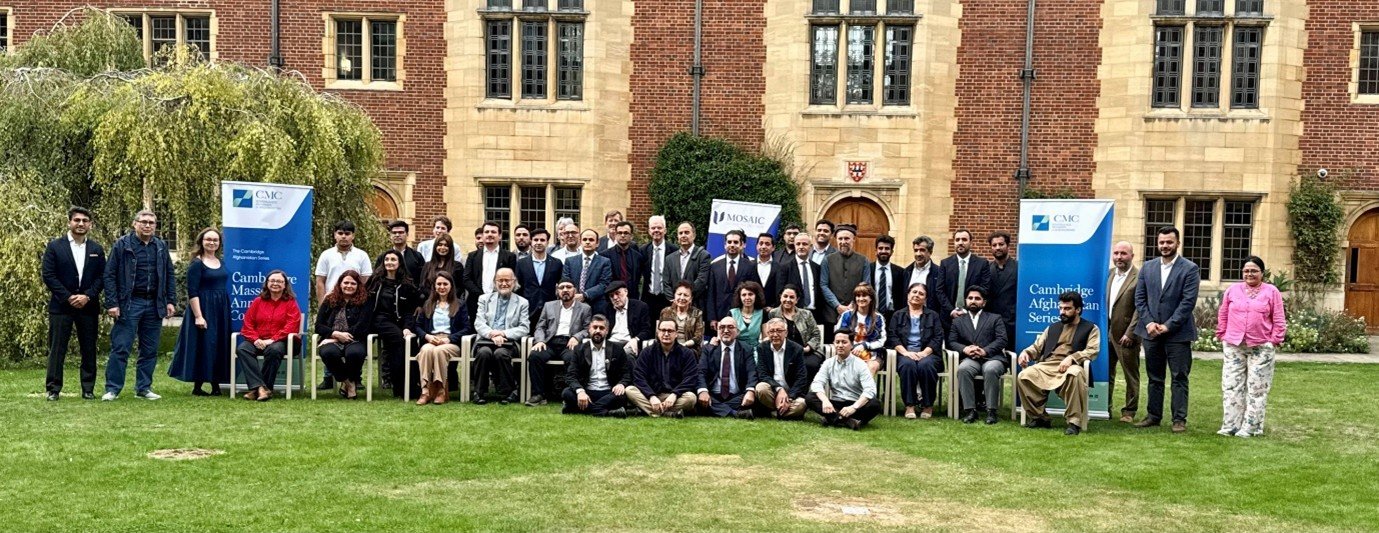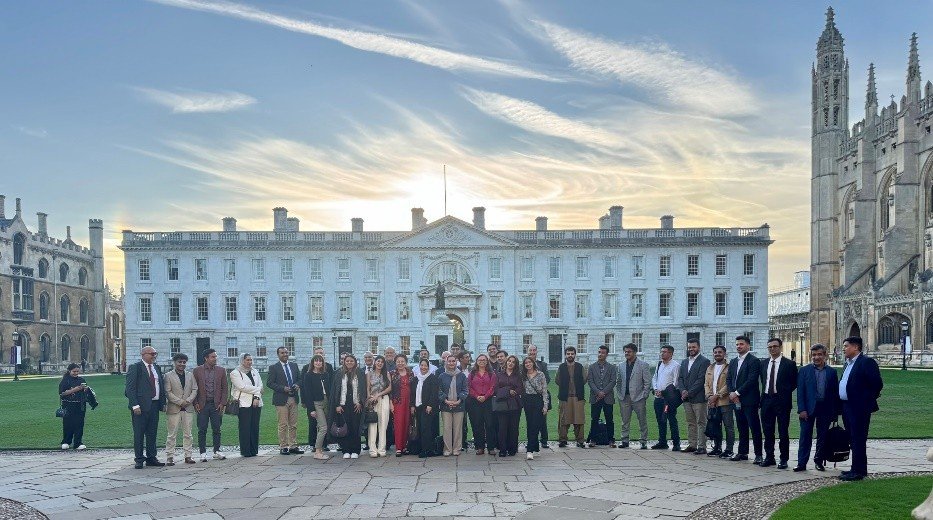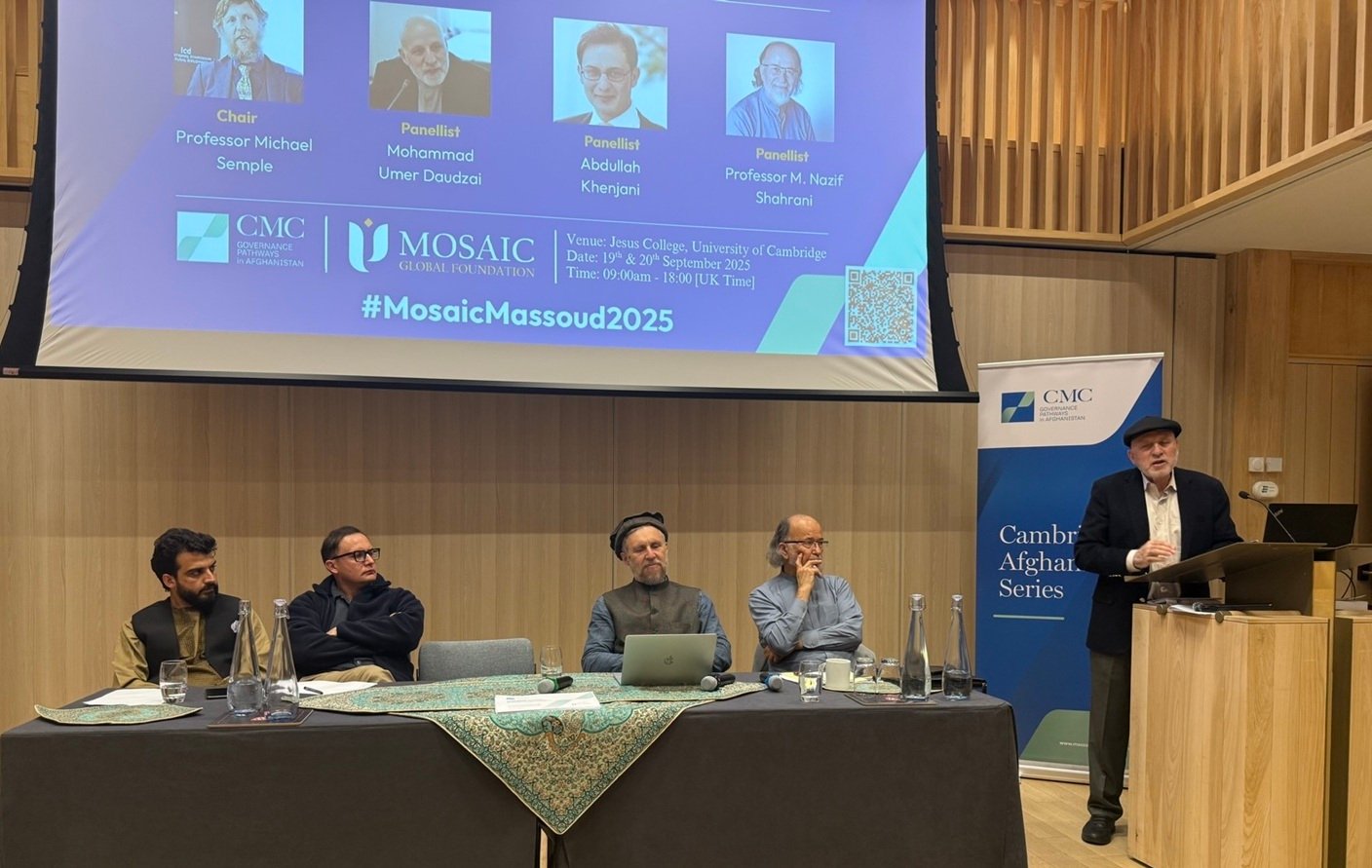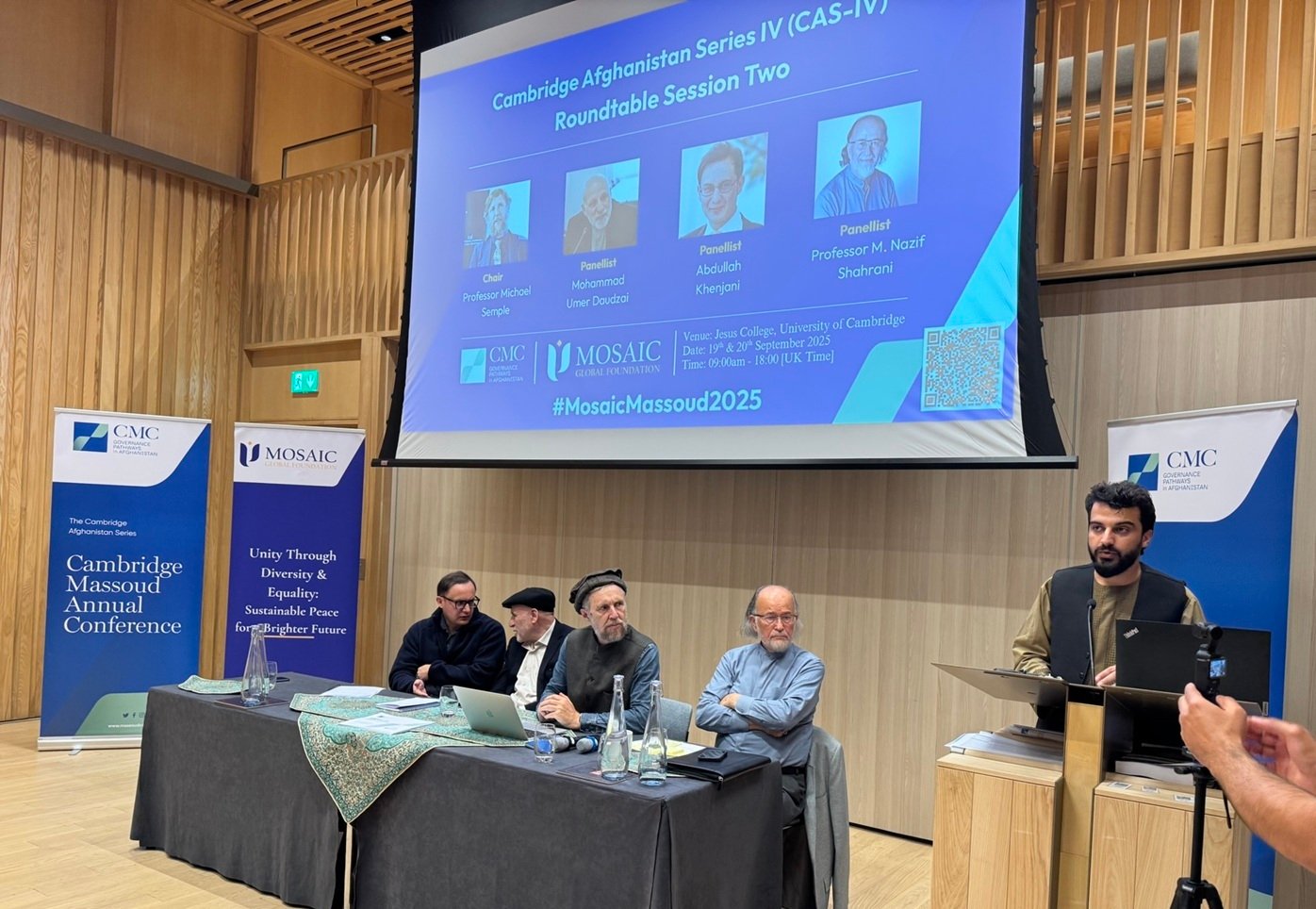
Chris Blackburn
This article by Chris Blackburn was originally published in the Narrative360 about Mosaic’s Cambridge Afghanistan Series IV (CAS-IV). Chris was a panelist in the conference and also Mosaic wishes to acknowledge that his assistance was substantial in convening CAS-IV (2025) at Jesust College, University of Cambridge.
The cloisters of Jesus College in Cambridge are used to weighty debates. For centuries, scholars have gathered in its panelled halls to wrestle with questions of politics, philosophy, and power. Yet on 19–20 September 2025, the air seemed heavier than usual. It was not only the crisp, but bright autumn weather that lent solemnity to the atmosphere, but also the sense of history pressing on Afghanistan’s future, which was once again on the table, debated far from Kabul, but with the urgency of a people still living under tyranny.
This was the Cambridge Massoud Conference (CAS-IV), organised by the Mosaic Global Foundation and part of the Cambridge Afghanistan Series. For two days, Afghanistan’s politicians, academics, civil society leaders, resistance figures, and international experts gathered to create what has been lacking among the democratic opposition to the Taliban: coherence.
Creating coherence between the diverse political groups, including armed resistance, civil resistance, and politico-diplomatic opposition, encompassing women, ulema, academics, and other societal strata, is a tall order, especially without any assistance from the international community. This latter element is key. But such support is sacrificed due to the rush to oblige all to “engage” with the Taliban. In addition, the expectation of the international community for a sudden “unity” among the democratic opposition to the Taliban is misplaced, as genuine democracy and pluralism are incompatible with the pursuit of artificial “unity.” Coherence entails negotiation and compromise. The opposition, indeed, tried to negotiate its way through coherence. Indeed, Mosaic Foundation’s attempt through CAS has been precisely this.
The centrepiece of CAS-IV was the Composite Comprehensive Roadmap (CCR) — a document that synthesised more than twenty proposals from political groups and civil society networks into a single framework. It promised a new starting point: not just another paper, but a reference for building a unified democratic opposition, one capable of countering the Taliban’s stranglehold on power as an alternative.
The conference’s convenor, Zalmai Nishat, set the tone in his opening remarks. He invoked the memory of Ahmad Shah Massoud — the late commander assassinated days before 9/11 — as not only a military leader but also a poet and thinker who rejected power without principle. “His assassination was not only an attempt to silence a man, but to silence a vision that rejected extremism and violence,” Nishat reminded participants. The Cambridge conference, he argued, was about reviving that vision —a multicultural, democratic, free, and equal Afghanistan at peace with itself and the world.
Nishat’s words carried more than symbolic weight. In recent months, his own role has grown internationally. Earlier in 2025, he had been invited to Islamabad by Pakistan’s Foreign Ministry, the Organisation of Islamic Cooperation (OIC), and the Muslim World League to speak at an event challenging the Taliban’s policies on women and girls. For an exiled person from Afghanistan to be hosted in Pakistan — traditionally the Taliban’s patron — was no small matter. It underscored how the democratic opposition of the Taliban was gaining recognition, even in places where the Taliban might expect sympathy.
Alongside him was his wife, Serpil Yilmaz, a director of Mosaic, who brought a human dimension into the discussion. She reminded participants that Afghanistan’s crisis was not only about geopolitics but about families displaced, daughters barred from classrooms, and mothers holding communities together in exile. “The struggle for Afghanistan is not just about borders or politics,” she said. “It is about people, people who deserve dignity, education, and hope.”

Day One: Confronting Roadblocks
The first day of the conference opened with keynote addresses that set the tone for what was to follow.
Sir Laurie Bristow, President of Hughes Hall and former UK Ambassador to Afghanistan, was blunt. Without a coherent vision, he warned, “we condemn ourselves to living with the present we have.” He painted a grim picture of a country where hunger and poverty are widespread, repression is systemic, and gender apartheid is state policy. Girls who were twelve in 2021, he noted, are now entering adulthood with no education and little preparation for life — a deliberate deprivation, not an accident. Borrowing Antonio Gramsci’s words, he called himself a “pessimist because of intellect, optimist because of will.”
From South Africa came a note of solidarity rooted in lived experience. Jeremiah Kingsley Mamabolo, South Africa’s High Commissioner to the UK, described the Taliban’s treatment of women as “gender apartheid” and a crime against humanity. Apartheid, he argued, was not just racial but could also be gendered and economic. He praised Afghanistan’s women for their courage, drew parallels with South Africa’s long struggle, and stressed that apartheid was only defeated by a combination of internal resistance and international solidarity. He urged the democratic opposition to the Taliban not to lose hope: “victory over apartheid would not have been possible without global solidarity built on shared values of justice, democracy and human rights.” South African adoption of the term gender apartheid and its support of the democratic opposition in Afghanistan is another milestone besides the CCR.
Panel 1: Launching the Composite Comprehensive Roadmap
The morning’s main event was the formal presentation of the Composite Comprehensive Roadmap (CCR). For years, Afghanistan’s politics, both inside and in exile, have been plagued by fragmentation, characterised by overlapping roadmaps, competing voices, and rival councils. The CCR sought to break this pattern, merging proposals from over 20 movements into a single framework.
Journalist David Loyn, a veteran of reporting on Afghanistan, gave voice to the frustration many international actors have long felt: “The democratic opposition struggled in exile because the EU and others didn’t know who to call. The roadmap shows that dialogue is working. It provides hope to those who need it in Afghanistan.”
Ambassador Nasir Ahmad Andisha, Afghanistan’s Permanent Representative to the UN in Geneva, explained how the roadmap was designed to unite three layers of resistance — armed, civil, and politico-diplomatic — into a coherent democratic opposition. The aim, he said, was to overcome the old excuse of “no unity” and provide international partners with a credible interlocutor.
Yet not all were content with the concept alone. Professor Nazif Shahrani, one of Afghanistan’s most distinguished anthropologists, warned that unless the roadmap addressed the deeper problems of Afghanistan’s political culture —including person-centred leadership, inequality, reliance on external patrons, and systemic gender oppression — it risked repeating the failures of the past. Afghanistan’s instability, he reminded participants, was reflected in its history: 16 heads of state since 1880, most of whom were killed or overthrown, and nine constitutions written for rulers rather than for society.
While the CCR builds on an overlap of over 90 per cent between the roadmaps and proposals of the democratic opposition, the Working Group tasked with drafting the CCR boiled down the remaining 10 per cent differences to five significant national differences. The chair of the Working Group, Prof Sayed Hussain Eshraq and his colleague, Mr Ali Shariati, elaborated on this. Ali Shariati advocated for the devolution of power to the district level. Historical lessons and 21st-century norms, alike, he said, required Afghanistan to adopt a modern, participatory state. The roadmap, he reminded delegates, was not fixed but a living, open-ended document that required constant refinement.
After the launch of the CCR in panel one, the next five panels debated these national differences as a prerequisite for the “National Dialogue” aimed at achieving a political settlement in Afghanistan.
Panel 2: Response to Inequality: Inclusion, Ethnic Pluralism and Social Justice
The second panel dug into the structural question of governance. As a response to Afghanistan’s long cycle of instability and failure, Dr Yahia Baiza, a senior researcher, argued that pluralism must be institutionalised and cannot remain passive. It must be an active effort to legitimise diversity rather than tolerate it. He distinguished between passive diversity, which leaves inequality intact, and active pluralism, which requires building deliberate spaces for inclusion.
Dr Javeed Ahwar, drawing on ethnographic fieldwork among diaspora communities of Afghanistan in Hamburg, showed how contested identities — such as Afghan, Hazara, Tajik, and Persian-speaking groups — reveal deeper struggles over justice and belonging. He cautioned against reducing Afghanistan’s future to rigid ethnic formulas, noting that no province is mono-ethnic and that ethnic federalism risks reproducing exclusions at the local level. Citizenship, pluralism and multiculturalism, he argued, should be the basis for governance. Rahmatullah Yarmal argued that politicians exploit ethnic and sectarian differences for their own interests, while society shares a sense of belonging.
Panel 3: Strong Central State vs Federalism and Decentralisation
The afternoon turned to the national difference regarding the question of centralisation versus decentralisation. Matin Bek, drawing on his years in government, recalled how a centralised constitution had left Kabul unable to respond to provincial demands. Even elections mandated by law were repeatedly deferred. He concluded that centralisation had reached a dead end: had the Republic survived, it would have been forced into decentralisation.
Timor Sharan mapped the three political demands of a broad political coalition spanning from a strong central state, i.e. the status quo, on one side of the spectrum, and federalism on the opposite side of the spectrum, while in the middle is the demand for a Westminster-like parliamentary system with decentralisation of power to the existing 34 provinces.
Zulfia Abawi criticised the colonial roots of institutions and discussed the need to think critically about institutions rooted in history and society to decolonise politics in the country.
Panel 4: International Actors and Democratic Transitions
The final session of the day examined Afghanistan’s place in international politics, which is contested among the roadmaps and proposals reviewed for CCR.
Dr Marissa Quie, a Cambridge scholar, linked Afghanistan’s crisis to global questions of rights and legitimacy. She described the Taliban’s 100+ decrees since 2021 as institutionalised gender apartheid. Dialogue with the Taliban, she argued, could only serve resistance if grounded in strict non-recognition, conditionality, and parallel governance structures. International incoherence — from U.S. retreat to Europe’s aid fatigue and authoritarian bargains with Russia and China — risked normalising Taliban repression.
I observed that Afghanistan remained “on the global agenda,” even as the U.S. retreated. India, he noted, had combined principle and pragmatism, while China viewed Afghanistan through a dual lens of security and economic opportunity. The EU remained a key humanitarian donor but lacked a security role. I urged building a principled coalition centred on the Universal Declaration of Human Rights, with women’s rights as its foundation. In 1948, Afghanistan was one of the first countries to adopt the declaration.
Mirwais Samadi emphasised that international engagement must be aligned with the ownership of the Afghan people and argued that his country has repeatedly been treated as a temporary project, brought into focus only to be abandoned later. Unless the people of Afghanistan themselves shape their future, external support would only deepen marginalisation.
The day concluded with a cultural evening at King’s College, where Afghan, Central Asian, and Iranian music, poetry, and culture reminded participants of the region’s deep cultural roots and what is at stake. For a brief moment, amid the melodies, Afghanistan’s rich heritage eclipsed its current suffering.

Day Two: Building the Roadmap
The second day began with a keynote by Professor Shailaja Fennell, who reminded participants of Afghanistan’s position at the crossroads of Central, South, and West Asia. Its plural identity, she argued, must be reflected in any governance model and in the country’s political settlement.
Panel 5: Engagement Strategies and Resistance Dynamics
Another key contested area among the democratic opposition is the strategies of change. This panel brought the question of resistance to the forefront. Ali Maisam Nazary of the National Resistance Front (NRF) anchored his remarks in international law, citing Article 51 of the UN Charter and UN resolutions to argue that armed resistance was not only lawful but morally compelled. The Taliban, he said, systematically violated human rights, committed gender apartheid, and sheltered terrorists. Resistance was the only shield behind which dignity and liberty could survive.

Daoud Naji of the Afghanistan Freedom Front challenged the notion of dialogue with the Taliban. They were not a political group open to compromise, he argued, but an ideological movement defined by opposition to women’s rights and modern knowledge. Expecting them to evolve was like expecting fascists to embrace democracy. Resistance, he insisted, was not a choice but a necessity: “people either accept enslavement or fight for freedom.”
As an academic who recently led a workshop at Princeton University on the subject of resistance, Munazza Ebtikar delved into the myriad forms of resistance by the democratic opposition in Afghanistan.
Panel 6: Territorial Cohesion and National Identity
This panel attempted to address one of the most sensitive disagreements, which would necessitate a long-term dialogue and discussion between the democratic opposition: the issue of territorial cohesion, shared sense of belonging, shared citizenship, and spatial justice. Speakers drew on comparative cases to emphasise that almost no province in Afghanistan is mono-ethnic and that governance must avoid reproducing exclusion at the local level. Citizenship, pluralism, and multiculturalism, rather than rigid ethnic categories, must define the state’s identity in the future in Afghanistan.
Roundtables: Civil Society and Political Umbrellas
In the first roundtable, Ambassador Andisha reflected on how political upheavals had repeatedly uprooted civil society. The 2021 collapse, he said, had stripped Afghanistan of its “shock absorbers” against extremism. Civil society in exile had reached its limits. The challenge now was to sustain resistance and preserve social change under Taliban rule.
Journalist Zahra Joya captured the fatigue of repeating painful truths but insisted silence was not an option. Afghanistan’s women had been erased from public life, denied education, work, and even leisure. This was gender apartheid, she said, and the term must not be diluted.

In the second roundtable, Abdullah Khenjani of the NRF welcomed the CCR as a strong document but cautioned that the bullet points needed to be sequenced into actionable plans. The people of Afghanistan expected action, not more papers. Mohammad Umar Daudzai, former Interior Minister, currently the Interim Chief Executive of the National Assembly for Salvation of Afghanistan (NASA), an umbrella political coalition which includes over 70 political groups and civil society organisations, recalled “the good old days of Kabul,” paying tribute to martyrs like Burhanuddin Rabbani. He noted that the Taliban were now more divided than united, while the opposition was finding cohesion. He urged the creation of a grand political umbrella, announcing that NASA would seriously engage with the CCR and argued that the CCR should become the National Roadmap for the democratic opposition to the Taliban.
The representatives of other political groups also emphasised the potential of the CCR to become the National Roadmap for Afghanistan. They gave a mandate to the Mosaic Foundation and the Working Group to continue engaging with political and civil society groups to achieve this goal.
Closing Reflections: A Turning Point?
As the conference drew to a close, David Loyn offered reflections. The roadmap, he reminded participants, was not yet a constitution but a method toward one. Its significance lay not only in its content but in the fact that dialogue was working, that a fragmented opposition was finding coherence.
Then came the symbolic moment. Participants filed into the gardens of Jesus College for a final group photograph. As they lined up, one delegate was overheard saying, “This is the photo we will look back on in 50 years as being the turning point.”
It was an audacious claim, perhaps even wishful. Afghanistan’s history is littered with broken promises, failed experiments, and dashed hopes. Yet, for two days in Cambridge, Afghanistan’s activists and their allies demonstrated that a roadmap exists — one that, if acted upon, could replace decades of roadblocks with the possibility of a different future, and one that has been negotiated through an inclusive method to ensure maximum participation by almost all strata of the society.
Whether this gathering will indeed be remembered as a turning point remains to be seen. But it captured something rare: unity in diversity, clarity in purpose, and hope in the face of despair. For Afghanistan, that in itself may be a beginning.
Chris Blackburn is a seasoned strategist with over two decades of experience at the intersection of international relations, security policy, and sustainable development. He is the co-founder of Global Friends of Afghanistan (GFA) a network committed to amplifying Afghanistan's voices and fostering global solidarity. As founding editor of Narrative36 Chris curates thought-provoking analysis on conflict, compromise, and cooperation across South, Central and West Asia. Chris serves as a strategic advisor to Mosaic Foundation, where his insights help shape initiatives on pluralistic governance, civic resilience, and international engagement, and a member of the Composite Comprehensive Roadmap (CCR) Working Group. The CCR a strategic document with a huge potential to bring coherence among the Democratic Opposition in Afghanistan and become the National Roadmap for the Democratic Opposition. Chris's work reflects a deep commitment to human rights, democratic values, diversity, and the power of storytelling to drive change.
